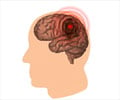Use of fluoxetine is a promising drug for treatment in patients suffering with ischemic stroke and moderate to severe motor deficit.

Earlier some clinical trials have suggested that fluoxetine (a drug used in the treatment of depression, obsessive-compulsive disorders) enhances motor recovery but its clinical efficacy is still unknown. The aim of this new study called “FLAME” (Acronym for - Fluoxetine for Motor Recovery After Acute Ischemic Stroke) was to investigate if fluoxetine was capable of enhancing motor recovery, when given soon after an ischemic stroke to patients who have motor deficits.
Method of Study - - At nine stroke centers in France, a double-blind, placebo-controlled trial was undertaken. The eligibility criteria for included patients was if they have had –
a. Ischemic stroke causing hemiplegia or hemiparesis,
b. Fugl-Meyer motor scale (FMMS) scores of 55 or less,
c. Age between 18 and 85 years.
Patients were randomly assigned in a 1:1 ratio to fluoxetine (20 mg once per day, orally) or placebo for 3 months starting 5—10 days after the onset of stroke.
All patients undertook physiotherapy. The primary outcome measure was the change on the FMMS between day 0 and day 90 after the start of the study drug.
Findings- of the study - 118 patients were randomly assigned to fluoxetine (n=59) or placebo (n=59), and 113 were included in the analysis (57 in the fluoxetine group and 56 in the placebo group). Two patients died even before day 90 and three withdrew themselves from the study.
The results showed that the Fugl-Meyer motor scale (FMMS) improvement at day 90 was significantly greater in the fluoxetine group than in the placebo group.
The marked adverse events in the fluoxetine and placebo groups were hyponatraemia, digestive disorders including nausea, diarrhea, and abdominal pain, psychiatric disorders, hepatic enzyme disorders, insomnia, and partial seizure.
Conclusion & Interpretation – I The study revealed that in the patients with ischemic stroke and motor deficit, the early prescription of fluoxetine along with physiotherapy helped in enhancing the motor recovery over the period of 3 months.
Reference: http://www.thelancet.com/journals/laneur/article/PIIS1474-4422%2810%2970314-8/abstract
Source-Medindia














